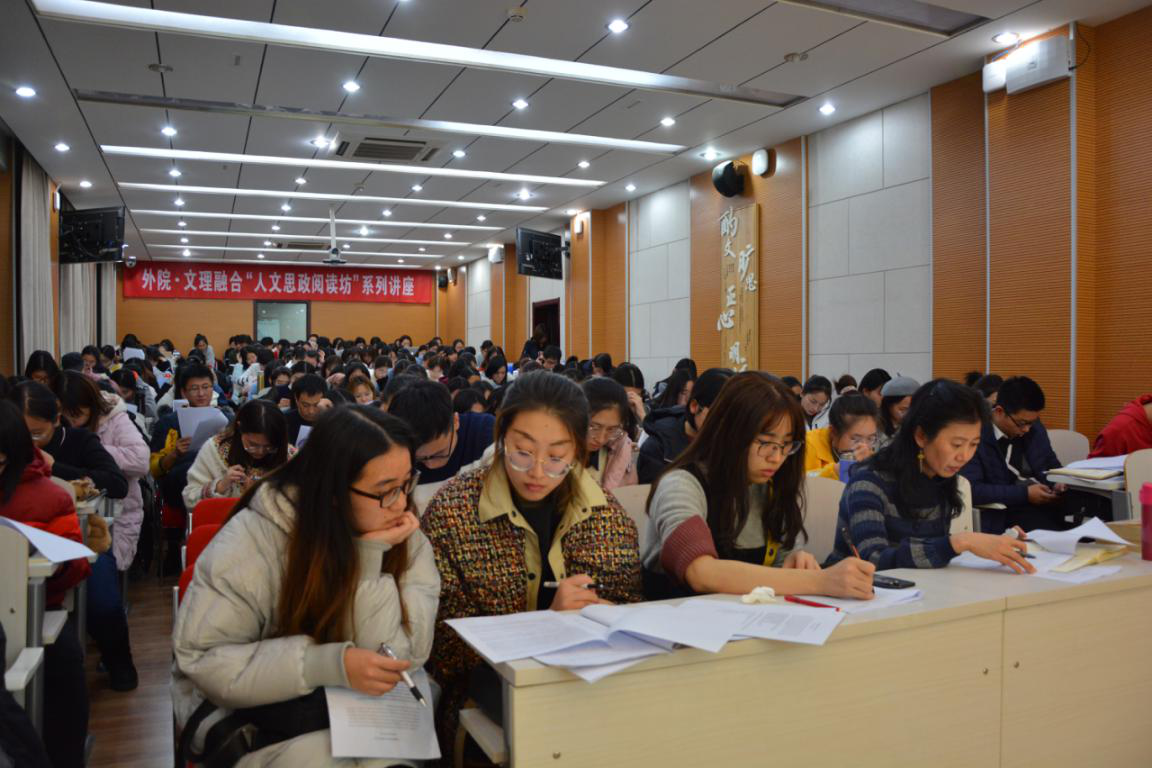The Second Lecture of “The Integration of Arts and Sciences— ‘Reading Workshop on Culture Humanities

How to Improve Learning in the Arts and the Sciences by Fast Reading of Literary and Non-literary works, the second lecture of “The Integration of Arts and Sciences— ‘Reading Workshop on Culture Humanities and Ideology &Politics’ of the SFS” Series , was held at 18:00, November 25th, in the Academic Hall in the SFS Building. This lecture was delivered by Professor Liang Xiaohui of the SFS, and was recorded by Himalayan FM. Communist Party secretary Zhang Qiuman, vicedean Wang Na, Fan Yiting, Wang Yinghui and teachers, as well as over 150 students from different schools attended .

Before the lecture, Fan Yiting elaborated on the importance of reading by using famous quotes and telling the story of his own academic development. He encouraged students to follow the speaker’s thoughts, review the lecture and form good reading habits.
Professor Liang began by playing movie clips, and illustrated the new standards required of students by showing an increase of 1500% in the rate of college admission from 1977 to 2019. She thought students in the present era should not only grasp and practice specific knowledge but also learn to think from a macro perspective. She then gave many examples of interdisciplinary talents like Lin Huiyin and Hua Luogeng to further identify the significance of extensive reading.
Professor Liang then led students to read articles with various stylistic features and taught them how to read and think about these. In the part entitled “Applying Fast Reading to Literary Texts”, she shared pictures of various flowers to train students’ ability to generalize and summarized the elements of the article as follows:: background, figures, conflicts and ending. In her view, when reading literary texts, “talking” with the writer and designing the subsequent plots could help students understand the content and improve their reading speed. She instructed students to read Appointment with Love, interacted with them and led students to generalize and think about this text, and inspired their passion for reading. In the part entitled “Applying Speed Reading to Non-literary Texts”, she compared the three primary colors “red, blue and yellow” with the three key points of expository writing, “typicality, parallelism and equality” in order to remind students to simplify complex questions. Then she guided students to revise their short compositions with above thoughts, developed their thinking methods, led them to read Comprehension Skills and emphasized the significance of logical thinking. Taking Huawei as an example, and its struggle against the obstacles placed in its way by western countries and its leading role in the 5G era, she encouraged students to overcome difficulties in an innovative way and apply speedreading to study, form good reading habits and sharpen their reading abilities. Students should use rich knowledge resources in the coming5G era, make a clear distinction between right and wrong and devote themselves to national development and construction. Finally, professor Liang recommended Romeo and Juliet and How to read a book to students. Students’ applause acclaimed the great success of the lecture.
In the future, another two lectures will be held, How to Argue by Integrating the Arts and the Sciences and How to Achieve the Chinese Dream by Creating Innovative Paths We welcome faculty and students to attend these lectures and explore the talent training model of integrating humanist education and science education.
